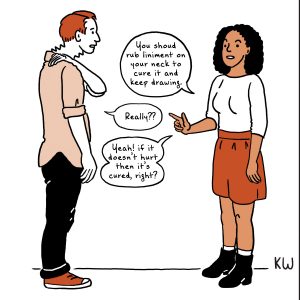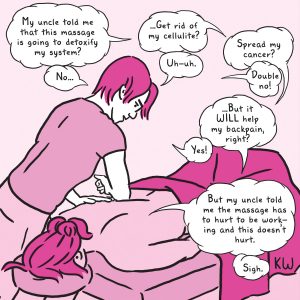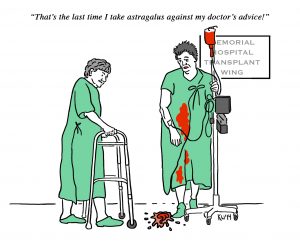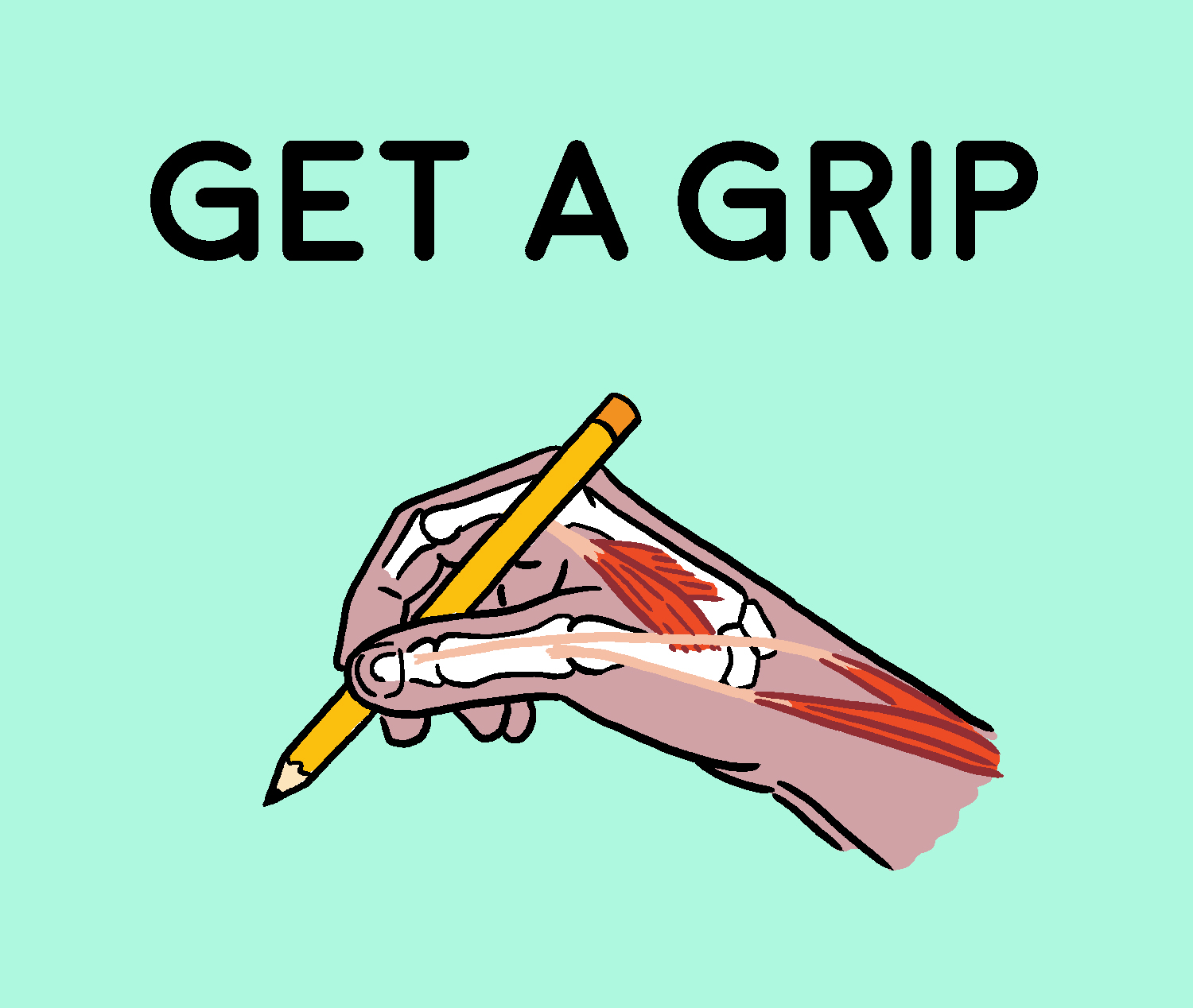GET A GRIP! is a column dedicated to exploring all the health issues that keep us from making comics in all its forms. Sure, musculoskeletal or nerve injuries are the first things that come to mind, but other states of health like asthma, addiction, cancer, mood disorder, epilepsy, chronic pain in any body part, and more, can wreck a creator’s life. Let’s expand our look at coping and thriving with conditions that can limit creative time.
One day, one of my students came to me for advice about an injury. They had fallen on their shoulder and gone to the doctor who had diagnosed the injury as a mild shoulder separation (the joint between shoulder blade and the collar bone was sprained). My student was in pain and they had a lot to do before the end of the semester. They weren’t sure how they were going to get through the end of the school year.

I asked the student what they had been doing to take care of the injury thus far, and they showed me a series of exercises that a friend had recommended. The exercises hadn’t reduced the pain at all. Why not? My student’s friend’s shoulder felt great! Why hadn’t this advice for an injured shoulder worked for my student? Because the exercises were correctives for an entirely different type of injury! The exercises didn’t do anything for a separated shoulder.
My student and I discussed strategies for resting the shoulder, protocols for icing, alerting certain professors about the nature of the injury, and finding a physical therapist. They also stopped doing those exercises.
We usually give advice because we want to help relieve the suffering of someone in pain. My student got bad advice, but it was the best kind of bad advice: the kind that won’t help you, but won’t hurt you, either!
Now I’m going to give you a piece of advice – When it comes to recovering from injury or illness, measure the suggestions of friends, family, colleagues, and non-professional healthcare strangers carefully before acting on their suggestions. Here are some questions to consider when advice (solicited or not) comes your way:
Who is giving me this advice? I have a friend who knows everything. E-V-E-R-Y-T-H-I-N-G! They happily share their knowledge with me and all our friends. A lot. Do I take their advice about restaurants? Sure. We like the same types of foods (everything but insects). Do I take their advice about movies? Hell no. I like my entertainment to be entertaining. I would not take their medical advice either, but I would take their financial advice. We all have areas of specialty and areas of conflicting tastes and areas where we are just plain stupid. You know where your friends are smart and where they are dumb. If a stranger or casual acquaintance is giving you the advice, the risk is greater.

How has the advisor learned this information? Is this knowledge transferred as personal experience? Research? Rumor? If the information was gleaned from “the internet,” ask for more specificity. If the person is a healthcare professional, nutritionist, or someone else with a really solid knowledge of the body and giving suggestions as a friend or good Samaritan, you may consider their advice.
Did you ask for this advice? You are under no moral obligation to even consider unsolicited advice. If you asked for it you may consider it, but you still are not obliged to take it.
Is the advice transferable? Remember the experience of my student! Their friend’s advice came from the authority of a physical therapist, but for a different injury! That kind of mistake can happen for any body part: I can think of four different causes of neck pain that would all be treated differently. Friendly suggestions of remedies may be off target. But on the other hand, advice can be welcome and helpful when someone has experienced rehab for the same injury that you are experiencing.
Is it safe? If you have a chronic health condition, allergies, are taking medications, or have dietary restrictions, think twice before starting vigorous exercise, or ingesting herbs, drugs, or other remedies without consulting a healthcare professional. Remember, certain herbs can interact with prescription and over-the-counter drugs in bad ways. “Natural” does not always mean “safe”!
Is it painful? Unless your physical therapist or physician has specifically told you that a certain therapy will be painful, if it’s hurting, it’s not working. Some manual therapies like massage may be somewhat painful, but don’t have to be painful to work. If you are trying something on your own without professional guidance, stop or do less if it hurts your injury.
How desperate are you? Is your injury merely annoying, or ruining your life? I don’t know about you, but I find that I’m willing to do some pretty stupid, expensive things when I’m desperate.
What is at stake if the advice doesn’t work? If you have cancer, diabetes, an autoimmune disorder, organ failure, or any other serious health condition, do not take friendly (or hostile) health advice without consulting your doctor first! You could die. I’m not kidding.

If you have a musculoskeletal injury or other chronic conditions like allergies or migraines that could make you miserable but not kill you, you have a little more wiggle room. If you want my advice (ha!) — if the condition is new, go through the conventional route of diagnosis and treatment first. Then, once your health is stabilized, you can start playing around with advice from others.
You might already know how the course of your condition will go if you have been coping with it for a long time. You might have a safety net of self-care skills in place in case the advice you take is a dud. When we’re already familiar with and educated about our health conditions, we are in a better place to experiment with other safe treatments. If this is a new situation, you may want to get a diagnosis or professional feedback before risking delayed healing or pain management in case the advice doesn’t work.
What to do?
Don’t worry! You don’t have to distrust every suggestion made by friends and colleagues to help you stay healthy. The trick is to do some homework so that you can take the great advice and leave the less helpful guidance alone.
Here are some useful sites that can help you care for yourself and weigh the validity of all those remedies that are going to get foisted on you the next time you come down with the flu or want to make healthy changes.
Medline Plus: A National Institute of Health/U.S. National Library of Medicine bonanza of trustworthy health information. Need health information specific to aging? Hormones? Tendinitis? Lab tests? Exercise? Diet? It’s all in there!
NIH/National Center for Complementary and Integrative Health: Interested in integrative medicine and therapies like massage, acupuncture, herbs, and more? You can get started here. They even have an NCCIH HerbList App with info about the safety and effectiveness of various herbal products.
AboutHerbs.com: Another great herbal database. It includes extensive information on Chinese as well as other herbs, including the latest research and whether a given herb may have a bad interaction with other herbs, drugs, or health conditions. The site is maintained through the Integrative Medicine Service at Memorial Sloan Kettering Cancer Center (my employer!), but I use it for my own cancer-free self-care all the time.
How To Start Exercising: A Beginner’s Guide To Working Out: Gives a very good, thorough introduction to exercise, its benefits, frequency, and more. It also has sample routines, which I always love. Squint a little when you read the information to help negotiate all the ads. (Sheesh!)
Draw Stronger!: Yes, I wrote this. But beyond the blatant self-promotion is a book full of science-y, clinical, and practical advice about injury prevention for creative types. Plus I have professional credentials. Trust me! (Ha!)
Need some advice on self-care? Message me at @Kriota on Twitter. I’m here to help!









“The rejected kidney falling onto the floor makes this bad advice funny.”
Really, Kriota, there is nothing funnier than when you explain the joke. It’s my favorite thing!
Comments are closed.